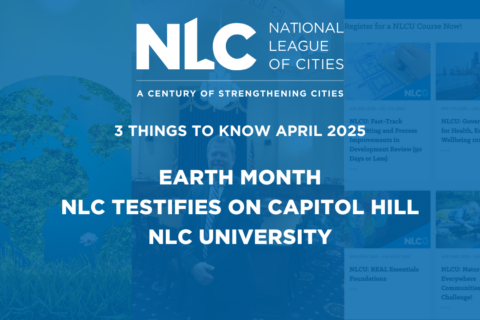In the first week of the Biden-Harris administration, over 30 executive orders and actions have been written and enacted, covering issues ranging from coronavirus to the economy to immigration.
NLC is keeping track of the executive orders most relevant to our National Municipal Policy and any executive actions with critical importance to America’s cities, towns and villages. It is important to note that many of these executive actions are narrow in scope and must be paired with meaningful legislation in Congress to create a lasting impact. Congress and the administration must work together in the days ahead to address the issues that keep city leaders and residents up at night, including supporting local governments with direct relief in response to COVID-19.
The Next Steps on the Pandemic
The Biden administration has enacted a dozen executive actions aimed at addressing the on-going COVID-19 pandemic in the first week in office. America’s communities need urgent support and NLC is pleased to see the administration putting the response front and center to their first 100 days agenda. Local leaders applaud the measures to ensure more robust testing and vaccine deployment, and we look forward to working with the administration to ensure that direct federal relief can come to all the cities, towns and villages on the front lines of this pandemic.
In addition, the Biden administration has asked the Department of Treasury and the Internal Revenue Service to look at economic impact payments (stimulus payments) and why 8 million households have not claimed or received their stimulus check. This is a great equitable step forward in our nation’s pandemic recovery efforts, ensuring all Americans get the payments they are entitled to.
Eviction Moratorium
The federal eviction moratorium signed by Former President Trump was slated to expire on January 31, 2021. President Biden instructed the Centers for Disease Control and Prevention (CDC) to extend the federal eviction moratorium through March 2021. Cities, towns and villages across the country are using federal emergency aid to postpone a broader crisis in housing and homelessness – exacerbated by the ongoing pandemic. The decline of housing opportunities is driving homelessness to levels that are overwhelming many local governments and service providers working at the intersection of mental health, substances use disorder and homelessness. The federal government and local governments must partner to make housing more affordable and accessible.
Increasing FEMA Reimbursement and Other Assistance
NLC is very encouraged that the new administration has taken steps to increase the FEMA cost-share to 100 percent for assistance under the Stafford Act for Category B Emergency Protective Measures. Cities, towns and villages are pleased that President Biden’s January 21st memorandum directs FEMA to ensure that such assistance extends to costs associated with providing safe opening and operation of eligible schools, child-care facilities, healthcare facilities, non-congregate shelters, domestic violence shelters, transit systems, and other eligible programs. The memorandum also confirms that FEMA assistance includes funding for the provision of personal protective equipment and disinfecting services and supplies.
Paris Climate Agreement
On day one, the Biden Administration re-committed the United States to the Paris Climate Agreement. This important commitment to resilience, sustainability and Leading Together has long been a local government priority. After the announcement of the United States’ withdrawal in 2019, cities declared “we are still in,” for the sake of the future health of our residents, economy and our planet. View NLC’s social media statement on the executive action.
Our Census, Our Power
Cities, towns and villages have been vocal advocates for the importance of a fair and accurate decennial census. One of the first actions of the new administration reversed the exclusion of unauthorized immigrants from the Census count. This change will help ensure equity and inclusion in the apportionment counting in our nation’s communities. NLC issued a statement welcoming the return to more than two centuries of precedent in determining national representation in Congress and the Electoral College.
Congress and the administration must work together in the days ahead to address the issues that keep city leaders and residents up at night, including supporting local governments with direct relief in response to COVID-19.
Addressing the Needs of Working Families
The Biden Administration signed two orders on January 22nd to bolster worker protections and boost federal food relief. By increasing aid payments by 15 percent for millions of low-income households with children, the administration is taking a necessary step to ensure the basic needs of our residents are met during the continued unprecedented challenges of the pandemic. View NLC’s social media statement on these two orders.
Preserving and Fortifying Deferred Action for Childhood Arrivals (DACA)
In 2017, the Trump administration sought to end the Deferred Action for Childhood Arrivals (DACA) program. NLC has long supported comprehensive immigration reform, including the preservation of the DACA program. On day one, the Biden administration took action to preserve and fortify the DACA program, which marks an important first step towards conversations around true immigration reforms that support local economies and residents.
Ensuring that Untested Rail Cars with Hazardous Gas Aren’t Rolling Through Communities
With the support of NLC, the House Transportation Committee Chair and safety experts, the President’s Executive Order titled, “Protecting Public Health and the Environment and Restoring Science to Tackle the Climate Crisis” pulls back a rule to permit the transport of liquefied natural gas (LNG) in untested rail tank car. NLC strongly urged the FRA and PHMSA to follow the advice of the National Transportation Safety Board (NTSB) and to validate safety before allowing the trains to move through communities.
NLC will continue to track executive orders and actions of the Biden Administration and their impact on America’s cities, towns and villages.








